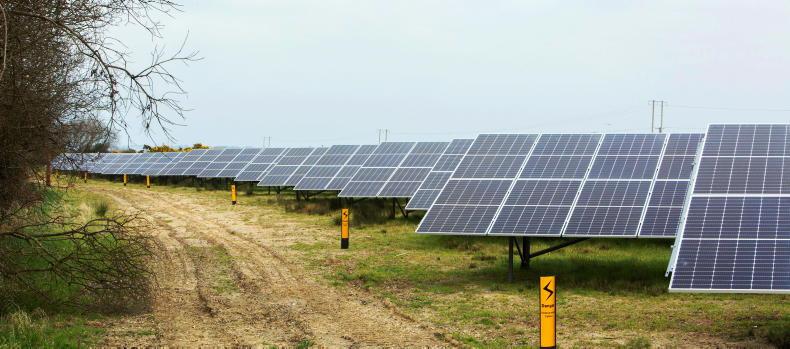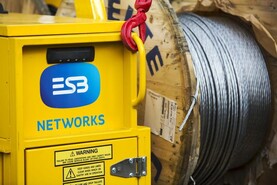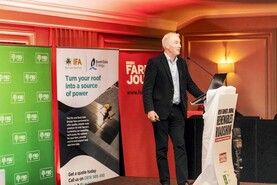Following the recent surge in construction inflation, concerns have been raised about the viability of many of the planned solar and wind farms around the country due to the increased costs in materials.
Some landowners are now asking if the solar or wind developer can terminate the option agreements and what this means for them.
When a solar or wind farm developer approaches you, they will typically request that you sign an “option” to grant them access to your land for conducting site assessments related to surveying and planning.
By signing the option agreement, you also agree to enter into a lease agreement with the developer once certain conditions have been met, such as obtaining planning permission, grid connection, and finance.
In exchange for signing the agreement with the developer, the landowner will usually receive an upfront non-refundable payment of around €3,000 to €5,000, along with additional annual payments for the duration of the option agreement, which is generally between three and five years.
If the developer secures planning permission, the landowner may receive a further payment. Additionally, if the developer exercises the right to enter into a lease, there may be another payment along with annual rent.
Timelines
It is important to note that if you sign an option agreement today for a solar farm, the developer will likely not be able to trigger the lease and begin construction for a minimum of four years. For a wind farm, it could take considerably longer.
This is due to the various steps that the developer must first undertake, such as obtaining planning permission, applying for grid connection, and then applying for the support scheme. Additionally, the developer must secure finance for the project before moving forward with development.
Termination
Option agreements for renewable projects will have a clause allowing the developer to terminate the agreement, generally on one month’s notice. In most cases, no reason is required.
In such cases, any outstanding payments due will be made up to the termination date.
The developer is also obligated to remove any equipment, reinstate or reseed the land, and remove the registration of the option agreement as a burden from the land folio.
Before signing an option agreement, landowners must carefully consider several important factors.
Once the option agreement is executed, it commits the landowner to the agreement and grants the developer the automatic right to initiate the lease during the initial or any extended option period. At this stage, the landowner is not entitled to renegotiate or terminate the lease agreement.
Tax issues
A farmer needs to be aware of the taxation issues associated with renewable developments.
For instance, income tax will be payable on the rent received from the lease. If the rent pushes the farmer into a higher tax band, they may be subject to just shy of 50% income tax, which is treated separately from their farm income.
Farmers must also be cognisant of the potential impact of entering into a solar or wind lease on gift or inheritance tax.
For example, if the solar farm lease covers less than 50% of your land, then the individual you transfer or will the land to may be eligible for agricultural relief.
On the other hand, if the beneficiary is unable to claim agricultural relief, they may be faced with a significant tax bill due to the increased value of the land with the solar panels.

James Staines.
It is worth noting that the land occupied by a wind turbine is generally not considered an agricultural asset, which may prevent the beneficiary from qualifying for agricultural relief if more than 80% of their assets are deemed non-agricultural at the time of transfer or assent.
This further emphasises the importance of carefully considering the tax implications of entering into a wind or solar lease agreement.
Farmers must ensure that they are obtaining the best and most up-to-date commercial terms when entering into a renewable energy lease agreement.
With a multitude of developers vying for land use, there is heightened competition in the market, leading to more favourable commercial terms for farmers.
It is essential that you take legal and taxation advice from advisers who have specific expertise in the area of renewables to ensure that you are getting the appropriate taxation and legal advice.
Following the recent surge in construction inflation, concerns have been raised about the viability of many of the planned solar and wind farms around the country due to the increased costs in materials.
Some landowners are now asking if the solar or wind developer can terminate the option agreements and what this means for them.
When a solar or wind farm developer approaches you, they will typically request that you sign an “option” to grant them access to your land for conducting site assessments related to surveying and planning.
By signing the option agreement, you also agree to enter into a lease agreement with the developer once certain conditions have been met, such as obtaining planning permission, grid connection, and finance.
In exchange for signing the agreement with the developer, the landowner will usually receive an upfront non-refundable payment of around €3,000 to €5,000, along with additional annual payments for the duration of the option agreement, which is generally between three and five years.
If the developer secures planning permission, the landowner may receive a further payment. Additionally, if the developer exercises the right to enter into a lease, there may be another payment along with annual rent.
Timelines
It is important to note that if you sign an option agreement today for a solar farm, the developer will likely not be able to trigger the lease and begin construction for a minimum of four years. For a wind farm, it could take considerably longer.
This is due to the various steps that the developer must first undertake, such as obtaining planning permission, applying for grid connection, and then applying for the support scheme. Additionally, the developer must secure finance for the project before moving forward with development.
Termination
Option agreements for renewable projects will have a clause allowing the developer to terminate the agreement, generally on one month’s notice. In most cases, no reason is required.
In such cases, any outstanding payments due will be made up to the termination date.
The developer is also obligated to remove any equipment, reinstate or reseed the land, and remove the registration of the option agreement as a burden from the land folio.
Before signing an option agreement, landowners must carefully consider several important factors.
Once the option agreement is executed, it commits the landowner to the agreement and grants the developer the automatic right to initiate the lease during the initial or any extended option period. At this stage, the landowner is not entitled to renegotiate or terminate the lease agreement.
Tax issues
A farmer needs to be aware of the taxation issues associated with renewable developments.
For instance, income tax will be payable on the rent received from the lease. If the rent pushes the farmer into a higher tax band, they may be subject to just shy of 50% income tax, which is treated separately from their farm income.
Farmers must also be cognisant of the potential impact of entering into a solar or wind lease on gift or inheritance tax.
For example, if the solar farm lease covers less than 50% of your land, then the individual you transfer or will the land to may be eligible for agricultural relief.
On the other hand, if the beneficiary is unable to claim agricultural relief, they may be faced with a significant tax bill due to the increased value of the land with the solar panels.

James Staines.
It is worth noting that the land occupied by a wind turbine is generally not considered an agricultural asset, which may prevent the beneficiary from qualifying for agricultural relief if more than 80% of their assets are deemed non-agricultural at the time of transfer or assent.
This further emphasises the importance of carefully considering the tax implications of entering into a wind or solar lease agreement.
Farmers must ensure that they are obtaining the best and most up-to-date commercial terms when entering into a renewable energy lease agreement.
With a multitude of developers vying for land use, there is heightened competition in the market, leading to more favourable commercial terms for farmers.
It is essential that you take legal and taxation advice from advisers who have specific expertise in the area of renewables to ensure that you are getting the appropriate taxation and legal advice.







 This is a subscriber-only article
This is a subscriber-only article











SHARING OPTIONS: